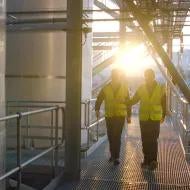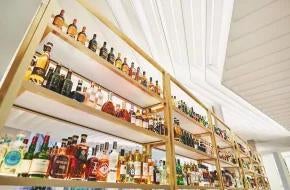● First industry-wide protocol & certification sets standard for Net Zero
● New easy-to-use digital platform helps restaurants go net zero cost-effectively
● Cost to compensate for greenhouse gas emissions could be as low as 7.5 pence per cover
1 October 2021: Today marks a major step forward in the restaurant trade’s journey toward net zero greenhouse gas emissions1, as the Net Zero Restaurants Initiative was unveiled at the Net Zero Festival exactly a month before the start of the global climate conference COP26 on 1 November. The Net Zero Restaurants Initiative puts the tools for action on the climate crisis into the hands of businesses in the sector.
Today’s announcement unveiled:
● An industry protocol that sets out a standard for Net Zero against which restaurants can be certified and receive an accreditation mark to display to customers.
● A dedicated, sector-specific digital platform providing a complete solution for operators to calculate their carbon emissions, set targets, get tailored reduction plans and compensate for pre-existing emissions.
● The findings of a pilot of the initiative with operators including Hawksmoor and Wahaca which shows that the cost per cover to reach net zero across the entire value chain could be as low as 7.5p on average.
Consumers increasingly look for hospitality venues that offer a more sustainable choice and employees are keen to work for companies that are taking action on climate2. The UK hospitality sector can also play a unique role in familiarising the public with the national net zero ambition. However, many restaurant owners say they need advice and support to get to net zero.
The Net Zero Restaurants Initiative has been developed by Net Zero Now, the small business climate action platform, working with its development partners Coca-Cola Europacific Partners (CCEP) GB and Pernod Ricard UK. It makes the process of going net zero easier and more cost-effective for businesses in the restaurant sector and will be rolled out by the Sustainable Restaurant Association. Together with the Net Zero Pubs and Bars Initiative it supports the whole hospitality industry to address its greenhouse gas emissions.
At the heart of the initiative is the Net Zero Restaurants protocol which provides an industry standard for reaching net zero greenhouse gas emissions and is freely available at www.netzeronow.org/restaurants. Following a robust development process, the protocol has been peer reviewed by a broad base of stakeholders, representing the sector and sustainability and climate experts, and is aligned with international climate science. Restaurants who follow the protocol can either be certified Net Zero or have their Net Zero target date certified.
Leading restaurants including Wahaca and Hawksmoor took part in the initiative pilot, which found that3:
● The vast majority of emissions are in the food itself (on average 77%), rather than operations (on average 18.5%) or drinks (on average 4.5%).
● The average cost per cover to compensate for greenhouse gas emissions was only 7.5 pence.
● If a pilot restaurant switched to 100% renewable energy tariffs, it could save nearly 600 tonnes of carbon (per year), equivalent to the greenhouse gas emissions of 67,000 gallons of petrol4
● If a pilot restaurant replaced 10 per cent of its meat use with plant-based options, it could save 350 tonnes of carbon per year, equivalent to the greenhouse gas emissions emitted by 76 cars being driven for a year4
● If they replaced one quarter of their dairy usage with plant-based options, this could save over 300 tonnes of carbon per year
Simon Heppner, Executive Director of Net Zero Now, said: “For the first time, the restaurant trade has a clear pathway to net zero carbon emissions and a dedicated platform which puts the tools for action on the climate crisis in the hands of all businesses regardless of size. The pilot programme has shown us that there is a strong demand from operators to make a positive change – and we’re able to make it simpler and cost-effective for them to do so. The need to reach net zero is common to all sectors but the challenges of getting there are different. As we expand the Net Zero Now model into other sectors, we will support the whole SME economy to become more sustainable.”
Will Beckett, founder of Hawksmoor, said: "Since we started in 2006 Hawksmoor has ‘tried to do things the right way’ with integrity and ethics at the heart of our business. Over the last 15 years we’ve developed what we mean by that into more concrete areas for action and specific goals. Being part of the launch group for the Net Zero Restaurant Initiative means that we’re now able to focus on prioritising plans which will have the biggest impact on reducing our carbon footprint - like recently putting the whole company onto a green energy supply, and sending 100% of our food waste to anaerobic digestion where it’s turned into biogas. We even give leftover bones to our customers for their dogs! Getting from carbon neutral to net zero is a big priority for Hawksmoor and we’ve got the whole team working towards it!”
Mark Selby, co-founder of Wahaca, said: "In 2016, Wahaca was the first UK restaurant group to be certified carbon neutral, and making sure that we do the best for the planet continues to be a driving force across everything we do - from carefully and responsibly sourced ingredients to designing our restaurants to operate at the highest possible sustainability levels. The journey towards net zero is not without its challenges, but as a business the focus on being as sustainable as we possibly can be is a hugely inspiring one, and so we're massively proud to be supporting the launch of the Net Zero Restaurants Initiative."
Juliane Caillouette-Noble, Managing Director of the SRA, said: "Having come through the pandemic, an existential crisis for the restaurant sector for which there was no plan, operators can now go into battle against climate change armed with a set of accessible, affordable and actionable tools. The Net Zero Restaurants Initiative is the best chance restaurants have to take tangible action to serve up meaningful change and enable their customers to use the power of their appetites wisely. We can't wait to start guiding restaurants towards net zero."
Julian Hunt, Vice-President, Public Affairs, Communications and Sustainability at CCEP GB said: “We can all set targets individually – as we have for CCEP to reach net zero by 2040 – but to really shift the dial, we need to work together as an industry. The initial pilots have generated some great learnings and insights, helping to shape clear guidelines for restaurants of all sizes to reduce emissions. With the Net Zero Pubs and Bars protocol’s already helping some of our customers accelerate their carbon reduction journeys, we’re thrilled to be able to support even more of the hospitality sector on the road to zero.”
Ian Peart, Commercial Director at Pernod Ricard UK, said: We know how vital the topic of sustainability is. 83% of UK consumers now expect food and drink brands to engage on at least one of four areas of sustainability; sourcing, packaging, carbon or fundraising, which is why it is critical we support our customers and are a valued sustainability partner to the trade. With COP26 just around the corner, the Net Zero Restaurants protocols will help our hospitality customers clearly understand what it takes to become net zero and we look forward to extending our involvement in this important initiative and making a valuable difference to the sector.”
-ENDS-
1. A definition from Deloitte for net zro is as follows: ‘Essentially, we reach net zero when the amount of carbon dioxide we add is no more than the amount taken away. These goals guide us to significantly reduce our absolute emissions and find ways to sequester any residual carbon emissions - so there’s no net increase in CO2’ According to the Science-Based Targets Initiative (SBTi) to reach a state of net zero emissions for companies implies two conditions:
a. To achieve a scale of value-chain emission reductions consistent with the depth of abatement achieved in pathways that limit warming to 1.5°C with no or limited overshoot and;
b. To neutralise the impact of any source of residual emissions that remains unfeasible to be eliminated by permanently removing an equivalent amount of atmospheric carbon dioxide.
2. Census wide survey 2020: https://www.reutersevents.com/sustainability/employees-want-climate-positive-action-companies-heres-how-they-can-deliver
3. The full sector pilot findings are available on request

























